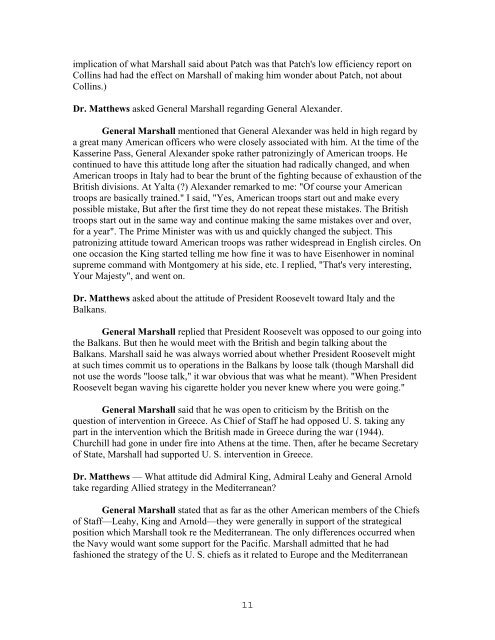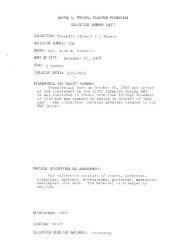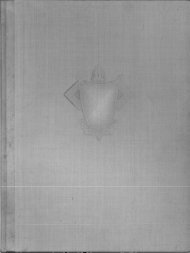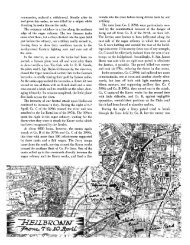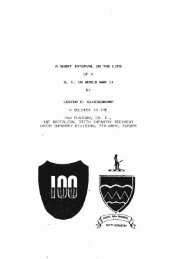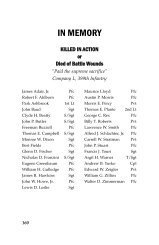July 25, 1949 - The George C. Marshall Foundation
July 25, 1949 - The George C. Marshall Foundation
July 25, 1949 - The George C. Marshall Foundation
You also want an ePaper? Increase the reach of your titles
YUMPU automatically turns print PDFs into web optimized ePapers that Google loves.
implication of what <strong>Marshall</strong> said about Patch was that Patch's low efficiency report on<br />
Collins had had the effect on <strong>Marshall</strong> of making him wonder about Patch, not about<br />
Collins.)<br />
Dr. Matthews asked General <strong>Marshall</strong> regarding General Alexander.<br />
General <strong>Marshall</strong> mentioned that General Alexander was held in high regard by<br />
a great many American officers who were closely associated with him. At the time of the<br />
Kasserine Pass, General Alexander spoke rather patronizingly of American troops. He<br />
continued to have this attitude long after the situation had radically changed, and when<br />
American troops in Italy had to bear the brunt of the fighting because of exhaustion of the<br />
British divisions. At Yalta (?) Alexander remarked to me: "Of course your American<br />
troops are basically trained." I said, "Yes, American troops start out and make every<br />
possible mistake, But after the first time they do not repeat these mistakes. <strong>The</strong> British<br />
troops start out in the same way and continue making the same mistakes over and over,<br />
for a year". <strong>The</strong> Prime Minister was with us and quickly changed the subject. This<br />
patronizing attitude toward American troops was rather widespread in English circles. On<br />
one occasion the King started telling me how fine it was to have Eisenhower in nominal<br />
supreme command with Montgomery at his side, etc. I replied, "That's very interesting,<br />
Your Majesty", and went on.<br />
Dr. Matthews asked about the attitude of President Roosevelt toward Italy and the<br />
Balkans.<br />
General <strong>Marshall</strong> replied that President Roosevelt was opposed to our going into<br />
the Balkans. But then he would meet with the British and begin talking about the<br />
Balkans. <strong>Marshall</strong> said he was always worried about whether President Roosevelt might<br />
at such times commit us to operations in the Balkans by loose talk (though <strong>Marshall</strong> did<br />
not use the words "loose talk," it war obvious that was what he meant). "When President<br />
Roosevelt began waving his cigarette holder you never knew where you were going."<br />
General <strong>Marshall</strong> said that he was open to criticism by the British on the<br />
question of intervention in Greece. As Chief of Staff he had opposed U. S. taking any<br />
part in the intervention which the British made in Greece during the war (1944).<br />
Churchill had gone in under fire into Athens at the time. <strong>The</strong>n, after he became Secretary<br />
of State, <strong>Marshall</strong> had supported U. S. intervention in Greece.<br />
Dr. Matthews — What attitude did Admiral King, Admiral Leahy and General Arnold<br />
take regarding Allied strategy in the Mediterranean?<br />
General <strong>Marshall</strong> stated that as far as the other American members of the Chiefs<br />
of Staff—Leahy, King and Arnold—they were generally in support of the strategical<br />
position which <strong>Marshall</strong> took re the Mediterranean. <strong>The</strong> only differences occurred when<br />
the Navy would want some support for the Pacific. <strong>Marshall</strong> admitted that he had<br />
fashioned the strategy of the U. S. chiefs as it related to Europe and the Mediterranean<br />
11


